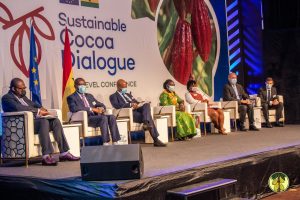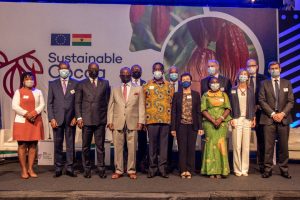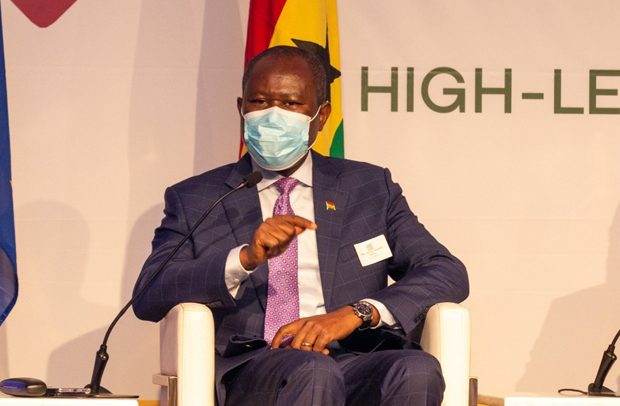Participants and stakeholders at the High-Level Conference on Sustainable Cocoa in Ghana agreed that, ensuring cocoa farmers earn remunerative incomes for the production of beans is the surest way to achieve a sustainable cocoa industry.
This understanding was reached after months of dialogue between Ghana and the European Union (EU), which intends to introduce stricter legislation on imported commodities, including cocoa, into its member countries.
Throughout the dialogue process, the Chief Executive of Ghana Cocoa Board, Joseph Boahen Aidoo has held the position that the fair international pricing of cocoa beans to enable farmers earn living incomes for their produce is key to sustainable cocoa farming.
He admitted during a panel discussion at the High-Level Conference on Sustainable Cocoa in Ghana, held on 30th June 2021 that, it is important to ensure that child labour and deforestation are tackled in all forms and that Ghana is committed to those causes, however, he was of the view that a well-remunerated farmer will be in a better position to engage the right kind of labour and adhere to the standards of sustainability.

He also insisted that issues of child labour and deforestation are overblown in the western media and by some civil society organizations who confuse the issues.
Mr Aidoo also expressed regret that some buyers of cocoa have adopted various means to undermine the Living Income Differential (LID). Such acts, he warned, undercut efforts at improving the earnings of farmers and pose a real and immediate threat to sustainability in the cocoa industry.
Another member of the panel, Ron Strikker, the Ambassador of the Netherlands to Ghana, said the dialogue has been very fruitful in allowing all parties to state their positions on the economic, social, and environmental pillars which impact sustainability in the cocoa sector. Further steps should then be taken to address the issues which have been identified.
Alex Arnaud Assanvo, the Executive Secretary of the Cote d’Ivoire-Ghana Cocoa Initiative also stated in his submission that, if the right to earn a decent living income by cocoa farmers is not respected and met, then it is unrealistic to expect that the farmers will be able to observe the human rights and environmental standards required to achieve sustainable cocoa production.

Leticia Yankey, who is the founder of Cocoa Mmaa and represented cocoa farmers on the panel said low incomes is what drives unsustainable practices.
Nonetheless, cocoa farmers in Ghana are capable of producing cocoa sustainably if given the right incentives.
Michel Arrion, the Executive Director of the International Cocoa Organization (ICCO), then said in his closing remarks after the panel discussion that the economic pillar for sustainable cocoa production should be topmost on the agenda of future dialogue between Ghana and the EU.
The tendency for cocoa buyers and importing countries to point to an uncontrollable market as the determining force behind international cocoa prices is unfair to producing countries. It is important, he stated, that the parties consider various interventions which can be deployed to address the present unfair pricing regime to achieve the ultimate goal of sustainability.
The High-Level Conference on Sustainable Cocoa in Ghana was organised by the EU to climax the first round of discussions with Ghana, as a cocoa-producing country, which began in March this year.
Present at the event were the Minister of Food and Agriculture, Owusu Afriyie Akoto; the Minister for Lands and Natural Resources, Samuel Abu Jinapor and the Minister of Employment and Labour Relations, Ignatius Baffour-Awuah.

